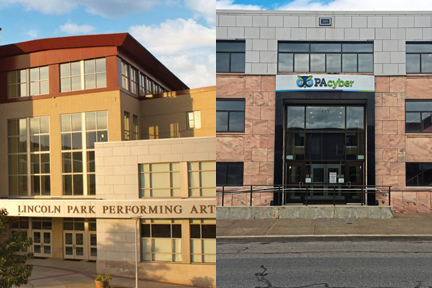Bills introduced in State House, Senate to reform charter schools

Lincoln Park Performing Arts Center (left) and PA Cyber (right) are two examples of different charter schools in the area that students living in the Freedom school district are enrolled in.
This year, there are 74 students who are enrolled in various brick-and-mortar charter schools or cyber charter schools that live within the Freedom school district. With the current state laws, the school district is expected to pay for the tuition of these students. The cost of these 74 students for the district is close to $1.1 million, which is one of the major causes of the current budget deficit. Currently, there are two bills in the state legislature, one in the House and the other in the Senate, that will help to change the way funding for charter schools works.
A charter school is a school that is operated independently from a school district that allows an increase in learning and opportunities for students and provides expanded education freedom. The two main types of charter schools are brick-and-mortar schools and cyber charter schools. Brick-and-mortar schools are physical buildings that students attend for their classes and operate under a local charter from the school district. One example of a brick-and-mortar charter school would be Lincoln Park Performing Arts school.
Parents choose to send their students to a charter school for a wide variety of reasons, such as a “free education” that is paid by the district they live in or for a different style of education than the one provided by public schools.
“Some families decide that they can have better control over the education, some families decide that their kids aren’t typical school people and don’t function well, so a charter school or cyber charter school is best for them, ” superintendent Jeffrey Fuller said.
A cyber charter school operates from a charter from the Pennsylvania Department of Education and uses technology in order to provide the curriculum without the requirement for students to be present at a physical school establishment. PA Cyber School is an example of a cyber-charter school.
The two new bills that were introduced would change the way tuition for students attending charter schools would be paid. House Bill 526 requires a child’s guardian to pay for the tuition that is set by the state, while Senate Bill 34 says that a charter school can not charge more for tuition for a student than what is determined by the state under a set of guidelines. Also included in the Senate Bill is a clause that states that if a district offers an in-house cyber program, then the district would not have to pay for any students that live in their district that attend a cyber charter school.
On March 14, superintendent Jeffrey Fuller presented to the school board a letter he and school board member Lorraine Rocco had drafted. This letter was to be delivered to senator Elder Vogel and state House representatives Robert Matzie and Jim Marshall urging them to vote for both of these bills to pass.
“I’m pushing so hard on these legislative items because we are paying $287,000 for 11 kids that are high school students that are identified as a special education student attending cyber school. We’ll pay what we should pay, but paying $26,000 each makes no sense when we could keep some of that money and use it here for our educational needs,” Fuller said.
The board also took further action on April 4 by introducing a resolution supporting Senate Bill 34 and House Bill 526. This movement of adopting a resolution to support these acts is just one of many that is being adopted across the state.
This resolution states that “the Freedom Area School District Board supports Senate Bill and House Bill 526 or other efforts to provide a fiscally commonsense approach that will provide savings for school districts offering full-time, online learning programs and are required to make tuition payments for their students to attend cyber charter schools.”


